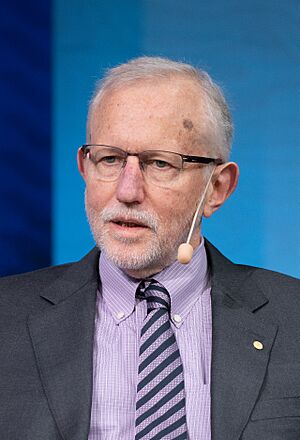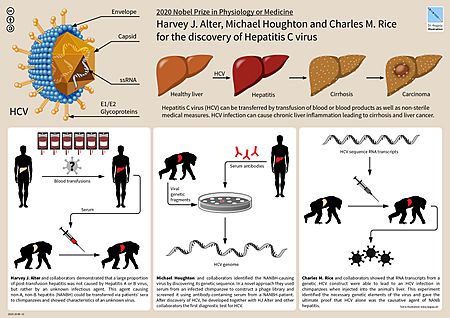Charles M. Rice facts for kids
Quick facts for kids
Charles M. Rice
|
|
|---|---|

Rice at 2024 Nobel Week
|
|
| Born |
Charles Moen Rice
August 25, 1952 Sacramento, California, U.S.
|
| Alma mater | University of California, Davis (BS) California Institute of Technology (MS, PhD) |
| Awards |
|
| Scientific career | |
| Institutions | |
| Thesis | Studies on the Structural Proteins of Sindbis Virus (1981) |
| Doctoral advisor | James Strauss |
Charles Moen Rice (born August 25, 1952) is an American scientist who studies viruses. He is famous for his important work on the hepatitis C virus. Dr. Rice is a professor of virology at Rockefeller University. He also teaches at Cornell University and Washington University School of Medicine.
Dr. Rice is a member of important science groups like the National Academy of Sciences. He was also the president of the American Society for Virology from 2002 to 2003. In 2016, he won the Lasker-DeBakey Clinical Medical Research Award. He shared this award with Ralf F. W. Bartenschlager and Michael J. Sofia. In 2020, he received the 2020 Nobel Prize in Physiology or Medicine. He shared the Nobel Prize with Michael Houghton and Harvey J. Alter. They won for discovering the Hepatitis C virus.
Contents
Early Life and Education
Charles Moen Rice was born in Sacramento, California, on August 25, 1952.
He went to the University of California, Davis. In 1974, he earned a Bachelor of Science degree in zoology. Later, in 1981, he received his PhD in biochemistry from the California Institute of Technology. There, he studied RNA viruses with his mentor, James Strauss. After getting his PhD, he continued his research at Caltech for four more years.
A Career in Science
After his time at Caltech, Dr. Rice moved his research team. In 1986, they went to the Washington University School of Medicine. He worked there until 2001.
Since 2001, Dr. Rice has been a professor at Rockefeller University. He also holds teaching positions at Washington University School of Medicine and Cornell University. He has helped advise important health organizations. These include the Food and Drug Administration and the World Health Organization.
He has also been an editor for several science journals. These include the Journal of Experimental Medicine and Journal of Virology. He has written over 400 scientific papers.
Discovering the Hepatitis C Virus
While at Caltech, Dr. Rice studied the genetic material of the Sindbis virus. His work helped show that flaviviruses are their own group of viruses. The specific strain of yellow fever virus he used was later important. It helped in making the yellow fever vaccine.
In 1989, Dr. Rice published a paper about how to create infectious flavivirus RNA in the lab. This research caught the attention of Stephen Feinstone. Feinstone was studying the hepatitis C virus. He suggested that Dr. Rice use his new method to help develop a vaccine for hepatitis C.
In 1997, Dr. Rice successfully grew the first infectious copy of the hepatitis C virus. This was a huge step. It allowed scientists to study the virus in chimpanzees. In 2005, Dr. Rice was part of a team that made another breakthrough. They showed that a specific type of the virus could be grown in a lab. This was important for understanding how the virus works. Dr. Rice's contributions to hepatitis C research have earned him many awards.
Awards and Honors
Dr. Charles Rice has received many awards for his scientific work:
- 1986 Pew Charitable Trust scholarship
- 2004 Elected fellow, American Association for the Advancement of Science
- 2005 Elected member, National Academy of Sciences
- 2005 Elected fellow, American Academy of Microbiology
- 2007 M.W. Beijerinck Virology Prize
- 2015 Robert Koch Prize
- 2016 Artois-Baillet Latour Health Prize
- 2016 Lasker Award
- 2020 Nobel Prize in Physiology or Medicine
See also
 In Spanish: Charles M. Rice para niños
In Spanish: Charles M. Rice para niños
 | Dorothy Vaughan |
 | Charles Henry Turner |
 | Hildrus Poindexter |
 | Henry Cecil McBay |


